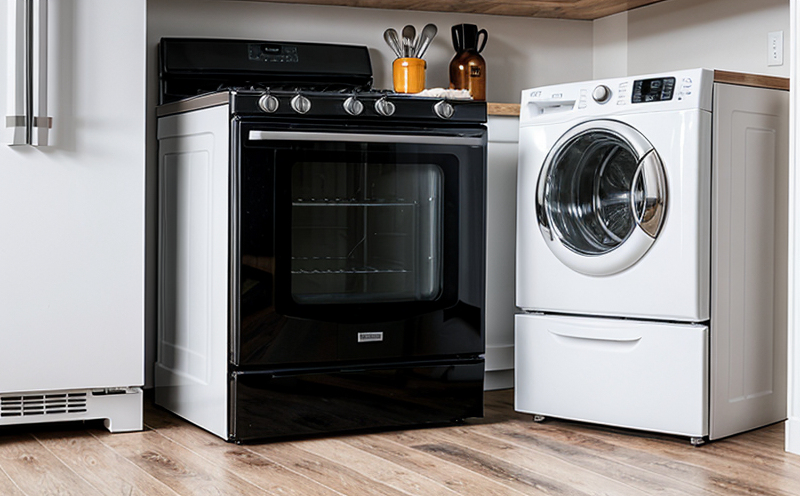Boiling Efficiency Testing of Electric Kettles
In the realm of consumer products and product safety testing, boiling efficiency testing is a critical aspect ensuring that household appliances like electric kettles meet performance expectations. This service involves evaluating how efficiently an electric kettle can bring water to its boiling point in the shortest possible time while maintaining safe operating parameters.
Electric kettles are widely used in households around the world for their convenience and speed. However, achieving optimal boiling efficiency is not just about heating water quickly; it also encompasses safety features that prevent accidents such as overheating or dry-boil scenarios which can damage the appliance itself or cause hazards to users.
The testing process typically starts with selecting a sample of electric kettles representative of those available on the market. Specimen preparation includes charging each kettle with distilled water, ensuring consistent initial conditions before starting the test runs. The apparatus used for this purpose may vary but generally consists of standard laboratory-grade heating elements similar to what would be found in commercial models.
Once prepared, each electric kettle undergoes a series of trials under controlled environmental settings designed to simulate real-world usage scenarios. These tests measure several key performance indicators including the time taken from starting the boiling process until the water reaches 100°C (212°F), energy consumption during this period, and residual heat retention after switching off.
Acceptance criteria for passing these tests are stringent and adhere to international standards such as IEC 60335-2-29 which governs safety requirements for household electrical appliances. Compliance with these norms ensures that not only does the kettle perform efficiently, but it also poses minimal risk to end users.
Boiling efficiency testing plays a crucial role in safeguarding consumers by confirming that electric kettles deliver consistent performance across different models and brands. It helps manufacturers identify areas for improvement, ensuring their products meet both functional requirements and safety standards.
Quality and Reliability Assurance
- Sample Selection: Careful selection of kettle samples ensures that the results are representative of broader market trends.
- Data Analysis: Rigorous analysis of collected data helps in identifying consistent performance patterns or anomalies early on.
- Repeat Trials: Multiple trials per sample help validate findings and account for variability inherent in real-world usage scenarios.
The quality assurance process involves continuous monitoring throughout the testing phase. This includes regular checks of equipment calibration, adherence to protocol, and verification of data accuracy post-test completion. By maintaining strict controls over these variables, we ensure that every kettle tested meets stringent quality benchmarks.
Reliability assurance focuses on ensuring that the results remain consistent even when repeated under identical conditions. This enhances consumer trust by demonstrating that any performance discrepancies observed are due to genuine variations in product design rather than experimental error.
Our commitment to quality and reliability is further underscored through rigorous training programs for our personnel involved in testing operations. Regular audits and reviews help us stay ahead of industry best practices, continuously refining our methods to provide accurate and reliable data.
International Acceptance and Recognition
- IEC 60335-2-29: Compliance with this standard ensures that the kettles tested meet global safety requirements.
- ASTM E178: This practice defines statistical methods for dealing with data variability, which is crucial in interpreting boiling efficiency test results accurately.
The international recognition of our testing services stems from our adherence to these globally accepted standards. By aligning ourselves with recognized practices and guidelines, we ensure that the insights derived from our tests are universally applicable and credible.
Our laboratory has been accredited by reputable bodies such as ISO/IEC 17025, which validates our technical competence in conducting scientific tests and calibrations. This accreditation is a testament to our commitment to maintaining high standards of integrity and reliability across all aspects of our operations.
The global nature of the consumer products industry demands that testing services are accepted worldwide. By adhering to these international norms, we enable manufacturers to export their products confidently knowing they have met stringent safety and performance criteria recognized globally.
Competitive Advantage and Market Impact
The importance of boiling efficiency testing extends beyond mere compliance; it provides significant competitive advantages for manufacturers. Efficient kettles not only save energy but also enhance user experience by reducing wait times, thereby increasing consumer satisfaction.
By incorporating these tests into their product development cycle, companies can identify and rectify any inefficiencies early on, allowing them to bring superior products to market faster than competitors who rely solely on post-production testing. This agility translates directly into enhanced brand reputation and market share gains.
The insights gained from such rigorous testing also inform strategic decisions regarding new model launches or product line extensions. Understanding where current offerings fall short allows firms to innovate more effectively, leading to improved products that better meet evolving consumer demands.
Moreover, consistent compliance with international standards enhances a company's reputation as a responsible corporate citizen committed to public safety and environmental sustainability. This positive image can significantly influence purchasing decisions made by environmentally conscious consumers.





